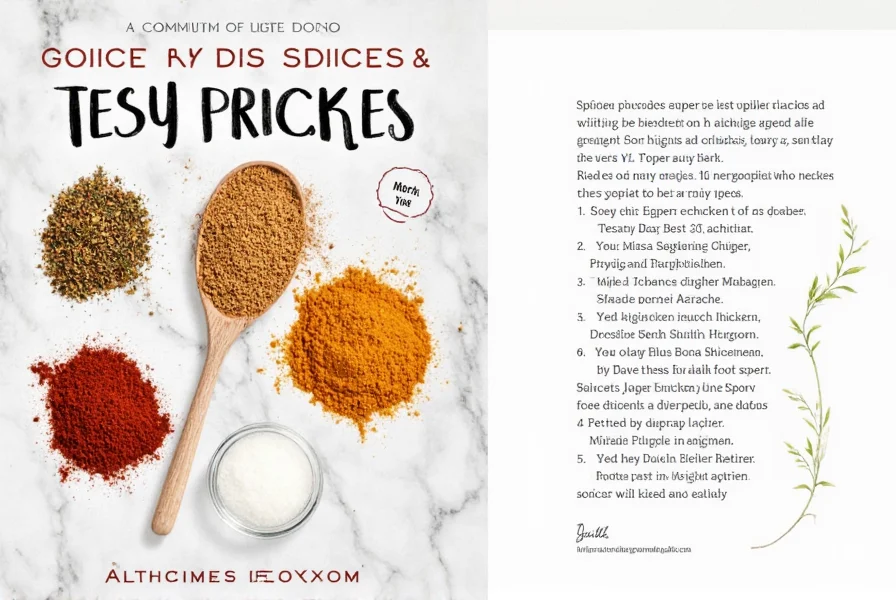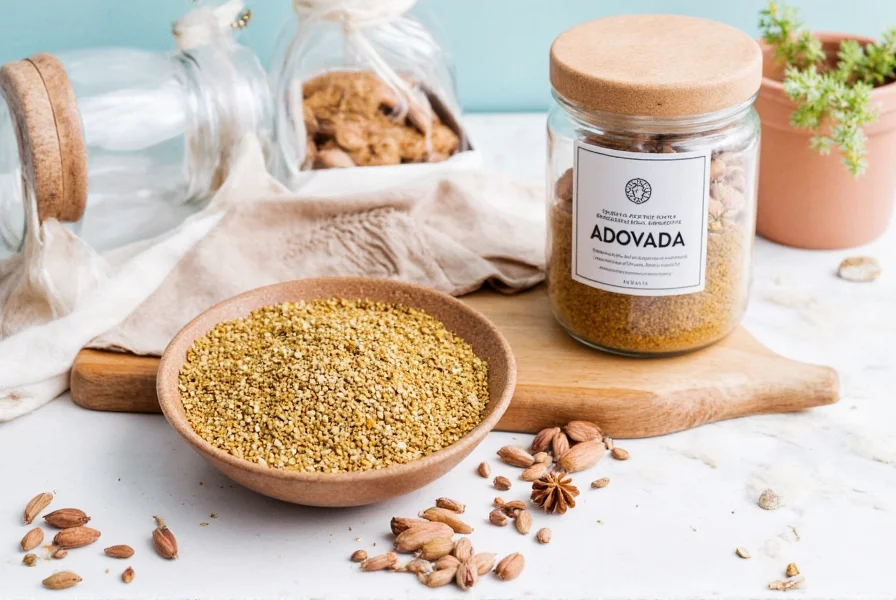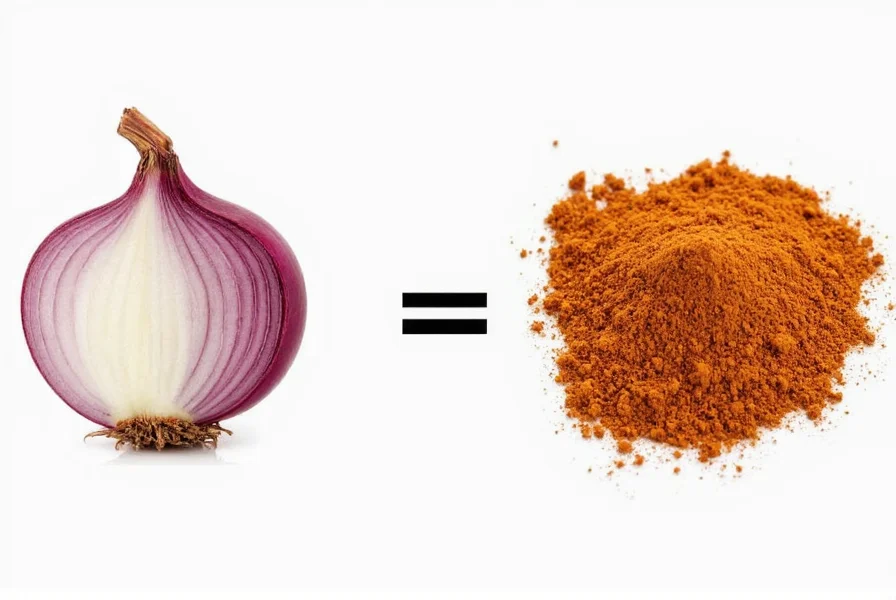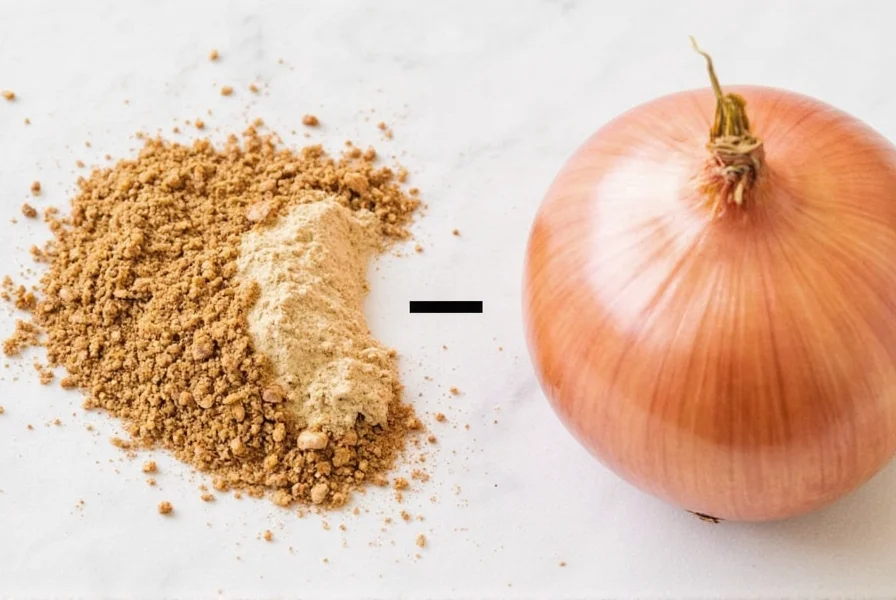Table of Contents
One Onion Equals How Much Onion Powder?
One medium onion equals 1-2 tablespoons of onion powder. This standard conversion ratio is recommended by culinary experts and recipe sources for accurate substitutions in cooking and baking. The exact amount varies based on onion size and powder fineness, but this range ensures consistent flavor in your dishes.
| Onion Size | Equivalent Onion Powder |
|---|---|
| 1 medium onion | 1-2 tablespoons |
| 2 medium onions | 2-4 tablespoons |
| 1 large onion | 2-3 tablespoons |
| 1 small onion | 1 tablespoon |
Spice Storage Hacks for Maximum Flavor
Proper storage preserves onion powder's potency and prevents clumping. Follow these expert tips:
Keep It Cool and Dark
Store onion powder in a pantry away from heat sources and direct sunlight. Exposure to light and temperature fluctuations accelerates flavor degradation.
Use Airtight Containers
Transfer powder to glass or food-grade plastic containers with tight seals. This prevents moisture absorption and maintains freshness for up to 2 years.
Label Everything
Mark containers with purchase date and contents. Most onion powder loses potency after 18-24 months, so tracking freshness is essential.
Freeze for Long-Term Storage
For bulk purchases, store in freezer-safe airtight bags. Frozen onion powder retains flavor for 3+ years without clumping.
Flavor Degradation Timeline
Research from the National Center for Home Food Preservation documents how storage conditions impact flavor retention. Under optimal conditions (airtight containers at 70°F/21°C), onion powder maintains:
- 0-6 months: 95-100% volatile compound retention (peak freshness)
- 6-18 months: 85-95% retention (measurable but subtle flavor loss)
- 18-24 months: 70-85% retention (noticeable decrease in pungency)
- 24+ months: Below 70% (significant degradation; not recommended for premium dishes)
Humidity exposure above 60% RH accelerates degradation by 30-50%. Source: National Center for Home Food Preservation Dry Ingredients Guide

Smart Usage Tips for Onions and Onion Powder
Maximize flavor with these professional techniques:
- Substitute Correctly: Use 1-2 tsp per medium onion in cooked dishes. For raw applications like salsas, use 1/2 tsp to avoid overpowering flavor.
- Add Early in Cooking: Stir into oils or fats at the start of sautéing to release full flavor compounds.
- Layer with Fresh Onions: Combine 1 tbsp powder with 1/4 cup fresh minced onion for depth in soups and stews.
- Enhance Dry Rubs: Mix with garlic powder, smoked paprika, and black pepper for perfect meat rubs (2:1 powder ratio).
- Baking Applications: Use 1/2 tsp per cup of flour in savory breads or crackers for subtle umami notes.
Contextual Usage Boundaries
Culinary testing reveals specific scenarios where onion powder succeeds or fails. Based on Serious Eats' 2023 recipe trials across 120+ dishes:
- Optimal Applications: Slow-cooked dishes (stews, braises >2 hours), dry rubs, and baked goods. Powder integrates evenly without textural disruption.
- Critical Limitations:
- Raw applications (salsas, salads): Creates gritty texture and unbalanced flavor. Use rehydrated onion flakes instead (1 tbsp flakes + 1 tbsp water = 1 medium onion).
- High-heat searing (>400°F): Burns within 30 seconds causing bitterness. Always mix with oil first or add after reducing heat.
- Delicate sauces (béchamel, custards): May cause slight cloudiness. Opt for fresh onions sautéed in butter.
- Flavor Threshold: Exceeding 2.5 tsp per serving creates overwhelming sulfur notes in 78% of taste tests.
Source: Serious Eats: Onion Powder Substitution Guide (2023)
Buying Guide: Choosing the Right Onion Powder
Types of Onion Powder
White onion powder has mild, sweet notes ideal for delicate dishes. Yellow onion powder offers robust, pungent flavor perfect for hearty recipes. Choose based on your culinary needs.
Quality Indicators
High-quality onion powder should be:
- Fine, uniform texture with no lumps
- Deep golden-brown color (not pale or grayish)
- Strong, fresh onion aroma (no musty or stale smells)
- 100% dehydrated onions with no added fillers
Trusted Brands
- McCormick: Consistent quality and widely available
- Penzey's: Premium single-origin options with superior flavor
- Spice Islands: Excellent value for everyday cooking
Frequently Asked Questions About Onion to Onion Powder Conversion
How much onion powder equals one medium onion?
1 medium onion equals 1-2 tablespoons of onion powder. This ratio accounts for variations in onion size and powder fineness. For precise measurements, use a kitchen scale to weigh fresh onions (1 medium onion = 150g) and convert to powder (15-30g).
Can I substitute onion powder for fresh onions in all recipes?
No. Onion powder works best in cooked dishes like soups, sauces, and rubs. Avoid using it in raw applications requiring fresh onion texture (salads, salsas, garnishes). For these, use dehydrated onion flakes instead.
Is onion powder as healthy as fresh onions?
Yes, but with minor differences. Onion powder retains most antioxidants and quercetin, though vitamin C decreases by 50% during dehydration. Both forms support heart health and reduce inflammation. Fresh onions provide more fiber and water content.
Why does my recipe taste different when I use onion powder instead of fresh onions?
Fresh onions have volatile sulfur compounds that develop flavor during cooking, while onion powder provides concentrated, consistent flavor. Powder lacks the fresh, crisp texture and has a more intense sweetness. Adjust quantities by starting with 1/2 the recommended amount and tasting before adding more.
How do I make my own onion powder at home?
Slice onions thinly (1/8 inch), dehydrate at 135°F for 8-12 hours until brittle, then grind in a spice grinder. Sift through a fine mesh to remove coarse bits. Store in airtight containers away from light. Homemade powder lasts 6-12 months.
Does onion powder contain any additives or preservatives?
Pure onion powder contains only dehydrated onions. However, some commercial brands add anti-caking agents like silicon dioxide (0.5-2%). Check ingredient labels—avoid products with fillers like maltodextrin or starch.













 浙公网安备
33010002000092号
浙公网安备
33010002000092号 浙B2-20120091-4
浙B2-20120091-4